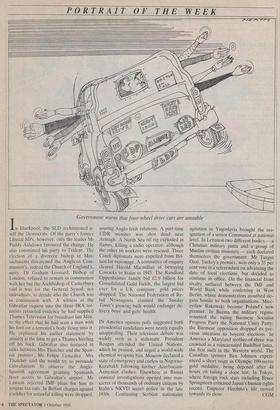PORTRAIT OF THE WEEK
Government warns that four-wheel drive cars are unstable In Blackpool, the SLD rechristened it- self the Democrats. Of the party's former Liberal MPs, however, only the leader Mr Paddy Ashdown favoured the change. He also committed his party to Trident. The election of a divorcée bishop in Mas- sachusetts threatened the Anglican Com- munion's, indeed the Church of England's, unity. Dr Graham Leonard, Bishop of London, refused to remain in communion with her but the Archbishop of Canterbury said it was for the General Synod, not individuals, to decide who the Church was in communion with. A witness at the Gibraltar inquest into the three IRA ter- rorists retracted evidence he had supplied Thames Television for broadcast last May, to the effect that he had seen a man with his foot on a terrorist's body firing into it. He explained his earlier statement by anxiety at the time to get a Thames hireling off his hack. Gibraltar also featured in talks between Mrs Thatcher and the Span- ish premier, Mr Felipe Gonzalez. Mrs Thatcher said she would try to persuade Gibraltarians to observe the Anglo- Spanish agreement granting Spaniards freer access to Gibraltar's airport. Mr Lawson rejected IMF pleas for him to reverse tax cuts. In Belfast charges against a soldier for unlawful killing were dropped, souring Anglo-Irish relations. A part-time UDR member was shot dead near Armagh. A North Sea oil rig exploded in flames, killing a radio operator, although the other 66 workers were rescued. Three Czech diplomats were expelled from Bri- tain for espionage. A committee of enquiry cleared Harold Macmillan of betraying Cossacks to Stalin in 1945. The Randlord Oppenheimer family hid £2.9 billion for Consolidated Gold Fields, the largest bid ever for a UK company; gold prices dropped. The National Federation of Re- tail Newsagents claimed the Sunday Times's growing bulk would endanger de- livery boys' and girls' health.
IN America opinion polls suggested both presidential candidates were nearly equally unappealing. Their television debate was widely seen as a stalemate. President Reagan attended the United Nations, which he praised, and urged a world-wide chemical weapons ban. Moscow declared a state of emergency and curfew in Nagorno- Karabakh following further Azerbaijani- Armenian clashes. Elsewhere in Russia criminal investigations opened into mas- sacres of thousands of ordinary citizens by Stalin's NKVD secret police in the late 1930s. Continuing Serbian nationalist agitation in Yugoslavia brought the res- ignation of a senior Communist at national level. In Lebanon two different bodies — a Christian military junta and a group of Muslim civilian ministers — each declared themselves the government. Mr Turgut Ozal, Turkey's premier, won only a 35 per cent vote in a referendum on advancing the date of local elections, but decided to continue in office. On the financial front rivalry surfaced between the IMF and World Bank while conferring in West Berlin, where demonstrators mouthed slo- gans hostile to both organisations. Miec- zyslaw Rakowski became Poland's new premier. In Burma the military r6gime renamed the ruling Burmese Socialist Progress Party the National Unity Party; the Burmese opposition dropped its pre- vious intention to boycott elections. In America a Maryland mother-of-three was crowned as a reincarnated Buddhist lama, the first such in the Western world. The Canadian sprinter Ben Johnson experi- enced a short reign as Olympic 100-metre gold medallist, being deposed after 48 hours on failing a dope test. In Tokyo, where foreign rock stars including Bruce Springsteen criticised Japan's human rights record, Emperor Hirohito's life moved


































































 Previous page
Previous page